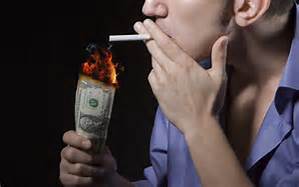Why Do Smokers Make Less Money
So tonight I was casually scrolling my Instagram feed, and it was pretty much the usual. Girls that I know were sticking their butts out while they take pictures with their friends, all the golf trick shot accounts I follow were posting mind blowing videos of people doing things I didn't even think were possible using golf clubs and golf balls, and all of my hippy friends were posting nature photos from their latest hikes. Then, I came across something that didn't seem quite right. It was an advertisement from the anti-smoking group, Truth, about the dangers of smoking. But rather than lament lung cancer or the amount smokers pay each year to feed their nicotine addiction, it spoke of a smoker's wage gap similar to the so-called gender pay gap. These folks claimed that smokers make 20% less money per year because they smoke. It seemed a little far fetched to me, so I decided to do some investigating into their claims. 
The null hypothesis in this case would obviously be that smokers make the same money as non-smokers and the alternative hypothesis is that smokers less money. While I was unable to find the exact data that lead to their claim that smokers make 20% less than nonsmokers, the CDC website states that about 26% of adults who make less than the poverty line smoke while only 15% of adults not living in poverty do so. So obviously there's something going on here with smokers and their disproportionately low incomes.
Next I decided to look to some other possible explainers for the data besides direct causality between smoking and making less money.
Reverse causality, that making less money may cause an individual to smoke, has a place in this discussion. The Health Literacy Special Collection mentions that for some, smoking is a means of stress relief because they have personal or financial problems. This environmental stress then makes it harder to quit smoking, according to the CDC.
There could also be confounding variables in play. Also based on CDC statistics, those who have an associates degree and higher are much less likely to smoke than those who have a high school diploma or less. Obviously, those with lesser education tend to make less than those who have pursued more advanced degrees. A possible mechanism for the discrepancy in smoking related to education could be that more educated individuals know better the effects of smoking and will avoid it. Time also reported that workers in the construction, mining, and hotel and foodservice industries, not particularly high paying jobs, smoke the most, all three of those hovering around a 30% rate. Some of the jobs where smoking is least prevalent are business management, finance and insurance, and science and tech fields, all with rates between ten and fifteen percent. The discrepancy here could also be due to the relative education levels of those with certain jobs or it could be due to the culture within these occupations. For example, construction workers spend all day outdoors and thus have more opportunity to smoke on their breaks while business managers spend all day in offices with no smoking policies.
In conclusion, while there seems to be something Truth's claim that smokers make less money, there doesn't seem to be enough evidence to back up the idea that smoking in and of itself is what is hurting smokers economically.
Photo Reference:
Take It From CVS: Quitting Smoking Could Save You Thousands
References:
Ranked: Jobs With the Most (and Fewest) Smokers
http://healthliteracy.worlded.org/docs/tobacco/Unit3/1why_people_smoke.html
http://www.cdc.gov/tobacco/campaign/tips/quit-smoking/guide/stress-and-smoking.html
https://www.instagram.com/p/BLjkvmohIbM/?taken-by=truthorange
Why Do Smokers Make Less Money
Source: https://sites.psu.edu/siowfa16/2016/10/18/wait-smoking-makes-you-earn-less-money-too/
Posted by: chavarriapoodut84.blogspot.com

0 Response to "Why Do Smokers Make Less Money"
Post a Comment